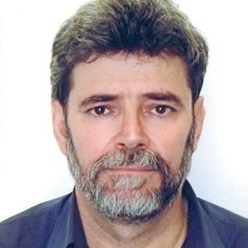 |
Michael Nikitas Vrahatis (Greek: Μιχαήλ Βραχάτης του Νικήτα)
> CV in Greek
|
Contact Information: |
Résumé last updated on August 30, 2022
Biographical sketch:
Michael N. Vrahatis (Greek: Μιχαήλ Ν. Βραχάτης) was born in Kalamata, Greece, on April 27, 1955.
He received his Diploma in Mathematics (first academic degree, Ptychio
) from the University of Patras in 1978
and his PhD in Mathematics from the same Institution in 1982.
His PhD advisor was Prof. Dr. Kosmas I. Iordanidis.
He subsequently performed his military service in the Hellenic Navy from January 1983 to March 1985.
He is a professor in the Department of Mathematics at the University of Patras since 2000.
He is founder of the Computational Intelligence Laboratory of the same department which he has been directing since its beginning in 2004.
He is also serving as the director of the newly founded Institute of Artificial Intelligence of University Research Center of Patras.
He has been teaching at the undergraduate level for
41 years (including 4 years teaching assistantship).
Also, he has been teaching distance learning classes at the Hellenic Open University for
21 years.
In addition, he has a teaching experience of
30 years at the post graduate level (including the year 2022–2023).
Several of his doctoral and/or postdoctoral students serve as full professors, associate professors, assistant professors or
lecturers in Greece and abroad
(see students and collaborators).
Scientific visiting: He was a visiting research fellow (faculty member) at the Department of Mathematics, Cornell University, Ithaca, NY, USA (1987–1988). He was a visiting professor at: a) INFN (Istituto Nazionale di Fisica Nucleare), Bologna, Italy (1992, 1994 and 1998); b) Department of Computer Science, Katholieke Universiteit Leuven, Belgium (1999); c) Department of Mechanical Engineering, Center for Ocean Engineering, Design Laboratory, MIT, Cambridge, MA, USA (2000) and d) Collaborative Research Center “Computational Intelligence” (SFB 531) at the Department of Computer Science, University of Dortmund, Germany (2001). He was a visiting researcher at: a) CERN (European Organization of Nuclear Research), Geneva, Switzerland (1992) and b) INRIA (Institut National de Recherche en Informatique et en Automatique), Sophia–Antipolis, France (1998, 2003, 2004 and 2006).
Scientific activities: He has served as an experienced reviewer and evaluator of several proposals for research funding organizations and centers of excellence, including, among others, ERC (EU), ESF (EU), FWF (Austria), GSRT (Greece), HFRI (Greece), IAP (Belgium), MITACS (Canada) and NSF (USA). He has participated in the organization of over 320 conferences serving at several positions, and participated in over 250 conferences, congresses and advanced schools as active participant, speaker or keynote speaker. He has served as a reviewer for 73 international scientific journals and 7 books. His editorial activities include work for 23 international scientific journals, journal special issues and book series (see scientific activities).
Scientific objectives and research interests: 1) Scientific objectives: His main scientific objectives are: a) the investigation and mathematical foundation of methods in computational intelligence and natural computing, b) the development of innovative methods in these fields, c) the application of the acquired expertise to address challenging real-life problems in different branches of science and the search of directions of theoretical mathematical results towards applications, and d) the dissemination of knowledge to young researchers and scientists. 2) Research interests: His current research interests focus on the following thematic areas: a) Numerical Mathematics, b) Natural Computing and Computational Intelligence, c) Global Optimization, d) Reliable Computing and Imprecise Data, and e) Artificial Neural Networks and Machine Learning (see publications and citations).
Publication metrics: 1) Number of publications: The corpus of his work consists of over 400 publications: a) 17 books (including one book published in USA), b) 152 papers in international refereed journals, c) 26 papers in invited and refereed book chapters, d) 73 papers in refereed book chapters and edited volumes, e) 172 papers in refereed conference proceedings and f) 76 other scholarly publications (including international technical reports (one of CERN, three of INRIA, three of University of Dortmund), invited book–reviews, seminar proceedings, two non–refereed journal papers and one non–refereed full–paper conference article, among others). 2) Journal impact factor and rank: According to the “2021 Journal Citation Reports (Clarivate Analytics, 2022)” the number of his publications with 2021 Journal Impact Factor is 134, with the highest being 16.497 (IEEE T EVOLUT COMPUT). The accumulated impact factor of the published journal papers is 472.525 and the average impact factor is 3.526. Also, according to “2021 SJR–SCImago Journal & Country Rank” these 134 journal publications are classified as follows: Q1: 79, Q2: 42, Q3: 9 and Q4: 4. 3) Number of citations: According to Google Scholar his work has been cited 18275 times, Also, 43 of his publications have received more than 100 citations each (i100–index=43). His highest–cited paper has been cited 2036 times, while his h–index is 60, his g–index is 127 and his i10–index is 213 (see publications and citations).
Links:
- You can also find him on: a) Google Scholar, b) Research Gate and c) The h–index for Computer Science.
- Here is his standing in the institution according to a) Google Scholar and b) AD Scientific Index.
- Here is his standing in his own country, in Europe and the World according to: a) The h–index for Greek origin Computer Scientists & Engineers, b) Research.com and c) AD Scientific Index.